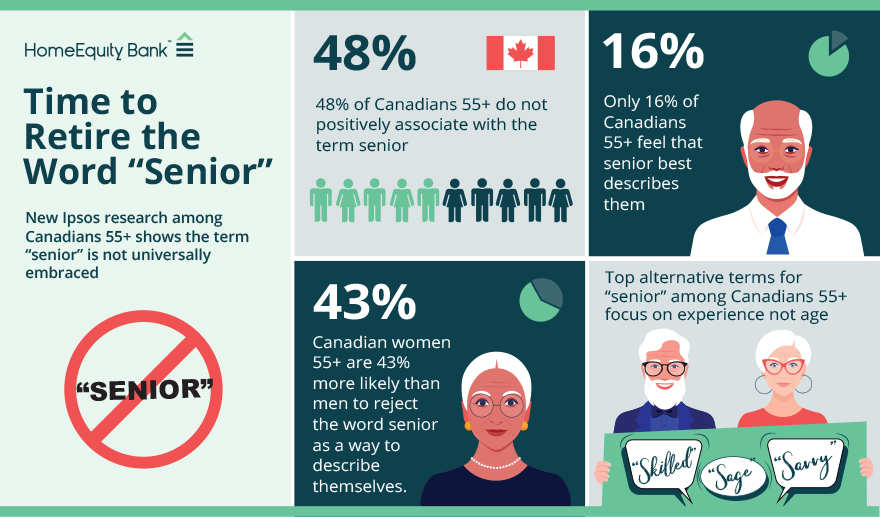HomeEquity Bank calls on Canadians to retire the word “senior” this National Seniors’ Day
- New research among Canadians aged 55+ shows the term is not universally embraced – with only half (52 per cent) positively associating with the word senior
- Only 16 per cent feel the word senior best describes them
- Women are 43 per cent more likely than men to reject the word senior as a way to describe themselves
- Of those who feel it is time to retire the word senior, “skilled,” “sage” and “savvy” are the top alternatives posed
TORONTO, Oct. 1, 2021 – In time for National Seniors’ Day, HomeEquity Bank, Canada’s leading provider of home equity-based retirement solutions, is calling on all Canadians to evolve their thinking around using the term “senior,” to describe people aged 55 and up.
A recent Ipsos survey of the demographic group commissioned by HomeEquity Bank found that the word doesn’t resonate with many Canadians who fall within the age range it represents, with only 16 per cent feeling that the word “senior” best describes them completely.
“Wanting to live an exciting, fulfilling life doesn’t stop when you hit a certain age. Canadians 55+ are some of the most vibrant, creative and dynamic members of our communities,” said Yvonne Ziomecki, Executive Vice President at HomeEquity Bank. “Today, we’re meant to celebrate Canadians known as seniors, so let’s use the day as an opportunity to understand how they’d prefer to be addressed so we can take action.”
Only 37 per cent of Canadian women aged 55+ feel the term senior accurately represents them. By comparison, over half (53 per cent) of Canadian men aged 55+ think the word senior describes them accurately. Based on these figures, HomeEquity Bank estimates that women are 43 per cent more likely than men to reject the word senior as a way to describe themselves.
Of those who indicated it was time to retire the word senior, research found that the top alternatives focused more on experience, like “sage,” “skilled,” or “savvy.” Although no consensus was reached on a substitute, the findings make it clear that not everyone is comfortable with the status quo and that means it’s time to re-examine the term.
Based on research conducted in 2019 around age bias in the media, HomeEquity Bank made a commitment to stop using the word “senior” in its marketing to the age group.
“Our business is working with Canadians 55+ who want the freedom to enjoy retirement on their terms, so this survey further reinforces what we have known for a long time,” said Ziomecki. “The word senior doesn’t resonate with everyone in the age group, and it’s time for individuals and brands to challenge the term that paints this diverse group of Canadians the same. With disruptive, reimagined language around aging we can embrace a more inclusive and effective way of communicating.”
HomeEquity Bank has been helping Canadians 55 and better navigate retirement on their own terms for more than 30 years, so they can retain their freedom while keeping their futures secure. Its flagship CHIP Reverse Mortgage allows for a safe and simple way to do that, by accessing the value of your home for tax-free cash to use how you want.
About HomeEquity Bank
HomeEquity Bank is a Schedule 1 Canadian Bank offering the CHIP Reverse Mortgage solution. The company was founded more than 30 years ago, and introduced a groundbreaking mortgage solution in Canada that has since helped many thousands of Canadians to unlock the value of their top asset – their home. HomeEquity Bank is committed to empowering Canadians aged 55 plus to live the retirement they deserve, in the home they love.
IPSOS Research Details
Ipsos is one of the world’s largest independent market research companies. Its commitment to driving the industry with innovative, best in class research techniques that are meaningful in today’s connected society is a primary goal. www.ipsos.com/en-ca. For this survey, a sample of n=1001 English-speaking Canadians aged 55+ were interviewed online via the Ipsos I-Say panel. Weighting was then employed to balance demographics to ensure that the sample’s composition reflects that of the age 55+ population according to Census data and to provide results intended to approximate the sample universe.
The precision of Ipsos online polls is measured using a credibility interval. In this case, the poll is accurate to within +/ – 3.5 percentage points, 19 times out of 20, had all English-speaking Canadians aged 55+ been polled. The credibility interval will be wider among subsets of the population. All sample surveys and polls may be subject to other sources of error, including, but not limited to coverage error, and measurement error.

